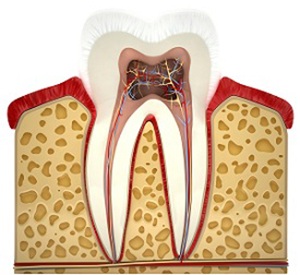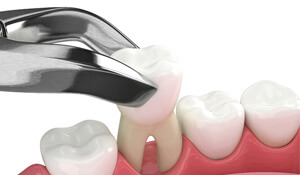Root Canal Treatment – Richardson, TX
The Key to Pain Relief and Tooth Preservation

At EPO Dental Specialists, we’re willing to bet that nearly everything you’ve heard about a root canal is either false or at least slightly exaggerated. The truth is a root canal is designed to erase the pain of an infected tooth, prevent the spread of infection, and help you avoid the need for tooth extraction. Furthermore, a root canal in Richardson is not at all painful itself! Let’s take a look at root canal treatment and understand how this common procedure can be the key to pain relief and tooth preservation.
Do I Need Root Canal Treatment?

Millions of bacteria live in your mouth. At the center of each healthy tooth is the pulp chamber. Here, blood, lymph and nerve tissue transport nutrients to the tooth and remove waste through root canals that connect to your bloodstream. If you have a large cavity, a loose filling, or a penetrating crack, then bacteria can access the pulp chamber. When this happens, infection may set in. As it grows in your tooth, the accompanying inflammation is usually very painful and can result in the following symptoms:
- Sensitivity to hot and cold temperatures, as well as the pressure of normal chewing or biting
- A sore on the gum tissue near the infected tooth
- Facial swelling
- Red, swollen, and inflamed gums
- Fever
Sometimes, however, there aren’t any symptoms, which is why regular checkups are so important. Fortunately, our Richardson dental team will be able to see the infection on an X-ray if you’re not experiencing any recognizable symptoms. But more importantly, tooth infection can be avoided when cavities and other kinds of structural damage are treated in a timely manner.
The Root Canal Process

Whether you want to call it a root canal, root canal therapy, or endodontic treatment, the procedure is the same. Our endodontist, Dr. Javier Ortiz, removes the infection from inside your tooth, fills and seals the tooth, and then creates a crown to protect what remains of your tooth.
After the tooth and surrounding tissue are anesthetized, Dr. Ortiz accesses the pulp chamber and root canals in order to remove infection, debris, and tissue. The area is then disinfected and filled with a biocompatible substance that expands to fill the chamber and root canals. This is needed to support the tooth and prevent recontamination. Lastly, the tooth is sealed and prepared for a porcelain crown that will protect your tooth.
Some discomfort may be felt after root canal treatment. For relief, most patients only need a few doses of an over-the-counter pain reliever. Depending on the severity of the infection, Dr. Ortiz may prescribe an oral antibiotic.
The Benefits of Getting a Root Canal

Let’s start with one of the biggest benefits of root canal treatment: it’s virtually painless. In fact, it’s designed to eliminate the infection to alleviate your discomfort in the short and long-term. There are other benefits, of course, including the fact that this emergency dental treatment can save your tooth from extraction. Lastly, the restoration used to cover your treated tooth moving forward is custom-made just for you and crafted from durable materials, ensuring the final result looks and feels natural too.
Understanding the Cost of Root Canals

Are you interested in learning more about the price of root canal treatment? If so, don’t go anywhere – you’re in the right place! In this next section, we’re covering the factors that affect the cost, if it’s cheaper to pull your tooth, and other helpful information on the topic.
Factors That Can Affect Root Canal Cost

Naturally, factors like the type and location of tooth that needs to be treated have to be considered. However, that’s just the start. In order to provide you with an accurate estimate of the price, we also need to consider if any other restorative care is needed, the complexity of your case, and the type of restoration that will protect your tooth from harm moving forward. Plus, we have to consider financial factors like dental insurance, which we will cover more in-depth below.
Is it Cheaper to Pull My Tooth?

It’s true that extracting the tooth is cheaper in some cases – at least initially. It’s important to consider all of the factors that are involved, however, including the price of the dental bridge, denture, or dental implant needed to fill the gap in your smile. In other words, root canal treatment may end up being the most cost-effective option when all is said and done.
Does Dental Insurance Cover Root Canal Treatment?

Depending on the fine print on your plan, your dental insurance may cover a portion of the cost of root canal treatment. If you’re not familiar with your benefits, it’s worth taking the time to call your provider to learn the ins and outs of your coverage, including if there are any waiting periods or annual maximums you need to consider. Of course, our team at EPO Dental Specialists can also help with this process since we are in-network with several popular providers, including Cigna, Humana, and Guardian.
Other Options for Making Root Canal Treatment Affordable

If you don’t have dental insurance, then ask us about CareCredit! This third-party financier offers several payment plans so you can break down the price of root canal treatment into smaller, more budget-friendly monthly chunks. In short, if paying for the entire cost in one lump sum doesn’t work for you, don’t worry – we’re here to help you navigate the financial side of your treatment as well.
If you still have questions regarding the cost of root canal treatment – whether it’s about dental insurance, flexible financing, or something else – you’re more than welcome to reach out to us so we can
Root Canal FAQs
Do you have a root canal in Richardson coming up soon? Maybe you’ve got some anxiety about it because of some scary rumors you’ve heard. Unfortunately, too many patients let worries influence their decision to put off the procedure which literally ends up costing them a tooth. At EPO Dental Specialists, we don’t want your nervousness to prevent you from regaining the healthy, natural smile you deserve. To put your mind at ease, our team has answered some frequently asked questions below. If you don’t see a question that’s been on your mind, be sure to contact our office!
Why Do I Need a Root Canal If My Tooth Doesn’t Hurt?
Intense tooth pain often leads people to their dentist’s office only to discover they need a root canal. However, just because you don’t feel any tooth pain doesn’t mean that everything is fine. It’s possible your tooth’s nerves have “died” due to trauma or infection without first feeling any discomfort, and so your tooth is no longer capable of feeling pain. Biannual dental exams are crucial to allow your dentist to check for any signs of trouble that you may not have noticed.
How Long Do Root Canals Take?
Although root canal therapy can usually be completed in one appointment, it may sometimes require two sessions. During your first visit, our dentist will place a temporary antibacterial medicine inside the tooth to relieve your pain. Then, you’ll return to the office at a later date to have the inside of your tooth cleaned out. In most cases, the procedure will take 30-90 minutes. Of course, the amount of time varies depending on the location of the tooth. Molars have more root canals that must be disinfected than front teeth, so root canal therapy for back teeth usually takes more time.
Are Root Canals Safe?
Faulty research conducted almost a century ago led to persistent rumors claiming root canals are unsafe and increase your risk of various medical conditions. However, the American Association of Endodontists (AAE) has thoroughly debunked this idea. Root canal therapy performed by a qualified dentist in Richardson is quite safe with a success rate of about 95 percent. As with any medical procedure, there is a very small chance of some bacteria remaining in the tooth after a root canal and causing reinfection. It’s important to play it safe, so be sure to let your dentist know if you experience intense swelling, pain, or fever in the days after your root canal.
How Long Does It Take to Recover from a Root Canal?
Even though the recovery time is different for everyone, most patients can return to their usual activities the day after their root canal. Keep in mind that strenuous exercise can divert blood from the site and delay the healing process. That said, if your job requires physical labor, it’s best to take the next 2-3 days off. Your mouth will also feel sore in the first few days after your procedure. Fortunately, you can manage your discomfort by taking over-the-counter pain medication and using a cold compress. While you heal, make sure you avoid chewing on the side of your mouth where the root canal occurred.
What Should I Do Before a Root Canal?
Although your dental team will handle everything once you arrive at our office – from completing the procedure to providing you with detailed aftercare instructions – it’s a good idea to dedicate some time to discussing what to do before your appointment. One example would be buying any supplies you may be missing, like soft foods and OTC pain medication. Many patients also find it helpful to keep everything they need during the recovery period in their nightstand or on the table by their couch. That way, bottled water, soft snacks, and the like are always within arm’s reach.
How Much Pain is Normal After a Root Canal?
During the root canal procedure, your mouth will be completely numb, so you won’t feel any pain or discomfort. Once that wears off, however, some soreness will begin to surface. The good news is that this sensation is temporary, and it can be alleviated with a few simple steps, including taking OTC pain medication, using a cold compress for 10 minutes at a time, and sticking to soft foods.
Note: If your discomfort persists past the three-day mark or your symptoms seem to be getting worse instead of better, call our Richardson dental team.
What Happens if You Wait Too Long for a Root Canal?
In short, the longer you wait, the more time the infection has to wreak havoc on your oral health. Sadly, there will eventually come a point where the damage is so extensive that the tooth can no longer be saved, and the surrounding teeth and gums are negatively impacted as well. For those reasons, we strongly recommend moving forward with root canal treatment sooner rather than later.
Can Root Canals Be Prevented?
Good news: root canals are largely preventable with preventive care. That starts with a solid at-home oral hygiene regimen (i.e., brushing every morning and evening, flossing daily, rinsing with mouthwash consistently) and extends to coming in every six months for a dental checkup and teeth cleaning. Doing what you can to protect your teeth from harm is important as well, which is why we recommend wearing a mouthguard if you participate in sports or grind your teeth at night. Make sure you avoid using tobacco products, biting your nails, and chewing on ice cubes too!
Can I Take Antibiotics Instead of Getting a Root Canal?
No, antibiotics are not a suitable replacement for root canal treatment. The reason why is that the medicine cannot reach the pulp of your tooth via the bloodstream and, therefore, cannot eliminate the infection. If you are interested in exploring your treatment options outside of root canal therapy, you’re more than welcome to reach out to us. We’d be happy to discuss the other emergency dental services we offer and the pros of each.
Do I Still Need a Root Canal if My Toothache Went Away?
There’s a common misconception that if the pain went away, then so did the reason for root canal treatment. The reality is that the infection can progress to the point where it “kills” the nerve of the tooth, and, at this point, it’s only a matter of time until your surrounding teeth and gums are negatively impacted. So, don’t postpone your appointment, even if your toothache subsides.
More to Explore
Endodontics Periodontal Care Orthodontics View All Our Services
